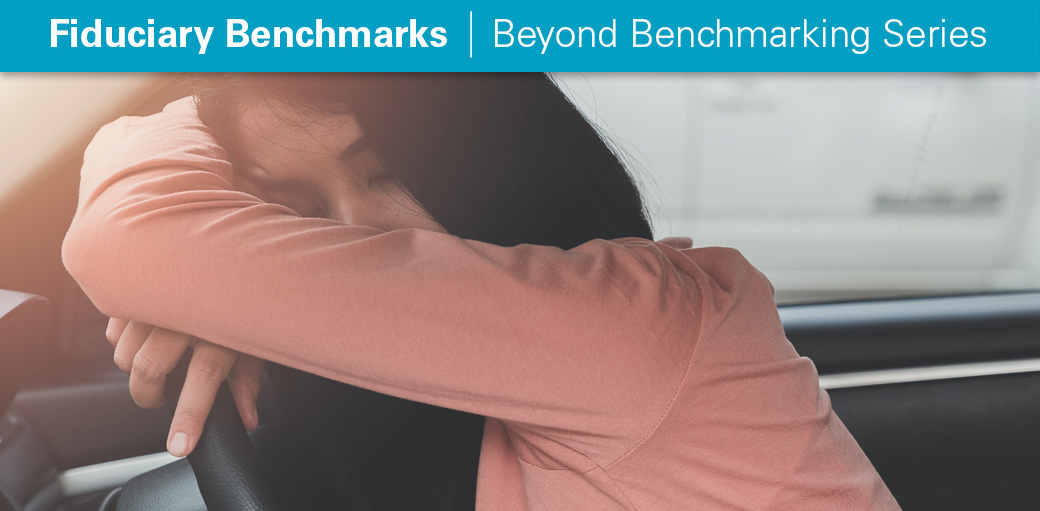Should Fiduciary Responsibility Take a Sick Day?
by Craig Rosenthal
Apr 02, 2020

With global concerns about the COVID-19 pandemic and millions of employees now required to work from home, how will fiduciary governance be impacted? As the stock market peaks and troughs, investors are panicking as they watch their retirement dollars ping pong up and down. It is a tense time for all. However, in this chaos and transition, should other priorities take precedent over the retirement plan committee’s fiduciary responsibility?
Plan Sponsor Response to Chaos
According to Malcolm Gladwell in the book “What the Dog Saw,” he explains that when a crisis happens, people generally respond in one of two ways. They either choke up or panic. When a person chokes up, they overthink a situation. Whereas, when a person panics, they think or act too little.
Choking Up: Overthinking
Looking at this situation through the actions of a plan sponsor, let’s say a plan sponsor client responds by overthinking. They request their advisor to host a daily check-in conference call. They want to know minute-by-minute market updates. Another example would be, if they just completed a thorough recordkeeper RFP and now, they want to re-do it. They want to re-confirm their recordkeeper is the right one for them. Or, they are emailing their retirement plan relationship managers with abstract and black swan “What if” scenario questions.
Then with each and every thoughtful response and reply by their plan advisor, relationship manager, and plan contacts, they pause. They wait. They aren’t ready to make a decision. They want all the answers to feel settled. However, they don’t want to make immediate decisions. The person is deep thinking, methodical, and choking up.
Panicking: Under Thinking
On the other hand, we’ve probably all experienced examples of panicking. Maybe in a worried frenzy the plan sponsor wants to protect the plan’s assets with a flight to safety. They contact their advisor and ask to change all the plan’s investments. They want to add more bond funds, stable value, and/or a money market. Or another example, with all the workplace disruption, the plan sponsor doesn’t see the importance of keeping the retirement plan committee meetings. They push this quarters meeting and want to skip the next quarters. They shirk their responsibility. They stop behaving with prudent oversight and want to put their head in the sand.
Being a Plan Sponsor is an Ongoing Responsibility
In times of chaos, it is best to seek balance and rationality. As a trusted advisor, this is an opportunity to communicate regularly with your clients and help them understand that fiduciary responsibility does not take a sick day. There are very real risks for fiduciary negligence.
It is normal for plan sponsors to have questions and concerns. At this time, it is important that their advisory team is present, helpful, and continues to provide valuable guidance. Encourage your clients to review their current investment policy statement and diversified offering of investment options. Continue to host (virtual) meetings and share plan updates. Discuss the importance of benchmarking reports, plan design analysis, and a long-term mindset.
Remind your clients that retirement plans are long-term investment vehicles. When their participants are investing in down markets, they are actually buying more shares and that is generally a good thing in the long-run. Also, the end goal of a retirement plan is to help their employees acquire assets to fund their future retirement income which means investing in all types of markets.
Additionally, we have weathered the storms of the 2001 tech bubble, the 2008 market crash, the Great Recession, and looking back over all that turbulence, the average growth rate of the S&P 500 still produced positive annual returns.
When we turn the corner of these challenging times, employees will still want to retire.
Encourage your plan sponsor clients to try to think rationally, methodically, and observe the fundamentals. It’s still their fiduciary responsibility to provide oversight of the retirement vehicle that helps their employees get to a dignified retirement. Help them act in the best interest of the plan participants and as a responsible, prudent person because fiduciary responsibility doesn’t take a sick day.
About Author:

Craig Rosenthal, Head of Strategy and Chief Marketing Officer
Craig is Head of Strategy and Chief Marketing Officer for Fiduciary Decisions. In this role, he is responsible for driving Product and Partnership strategy as well as the overall messaging and marketing for the firm.


